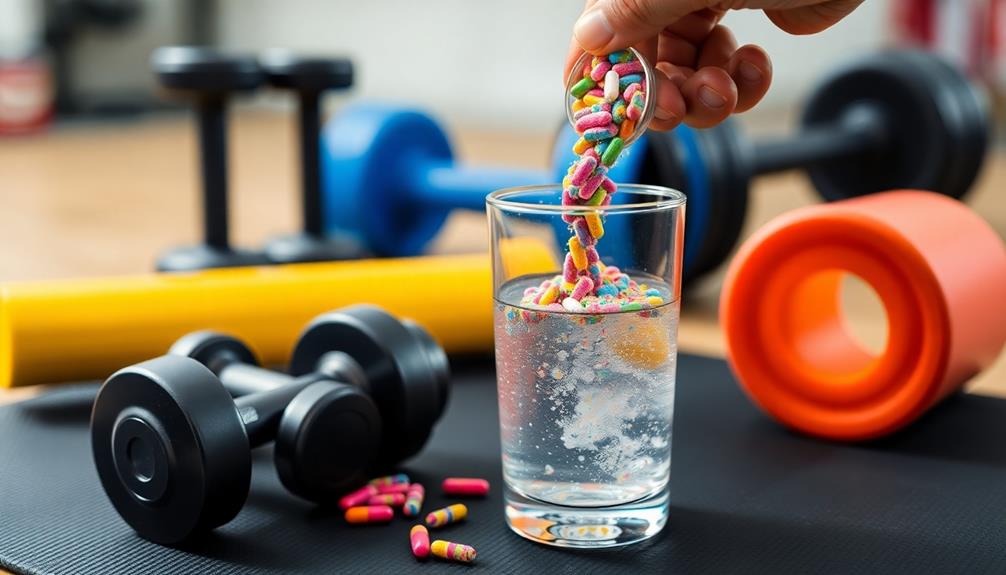To manage muscle repair during rest periods, focus on these five essential tips: First, prioritize sleep quality by maintaining a consistent schedule and creating a relaxing bedtime routine. Second, optimize your nutrition with adequate protein intake and post-workout meals. Third, implement active rest techniques like swimming or yoga to promote recovery. Fourth, manage stress levels through meditation or deep breathing exercises. Finally, consider strategic supplementation with protein powders, amino acids, and creatine to support muscle growth and repair. By incorporating these practices into your routine, you'll enhance your body's ability to recover and build strength. Let's explore each tip in more detail.
Core Insight
- Prioritize consistent sleep schedules and create a sleep-friendly environment to enhance recovery.
- Consume adequate protein and complex carbohydrates, especially post-workout, to support muscle repair.
- Engage in low-impact activities like swimming or yoga on rest days to promote active recovery.
- Practice stress-reduction techniques such as meditation or deep breathing to optimize muscle healing.
- Consider strategic supplementation with protein powders, BCAAs, and creatine to aid muscle repair and growth.
Prioritize Sleep Quality

Sleep is crucial for muscle repair. When you sleep, your body releases growth hormones that help your muscles recover from exercise and daily activities. Good sleep also improves your thinking, hormones, and metabolism.
To sleep better:
1. Go to bed and wake up at the same times every day
2. Wind down before bed with a relaxing routine
3. Make your bedroom comfortable
- Keep it cool and dark
- Use a comfy mattress and pillows
4. Avoid screens before bedtime
5. Don't have caffeine or big meals close to bedtime
6. Try using dark curtains or a white noise machine
Get 7-9 hours of sleep a night, or more if you're training hard. Focus on getting deep, consistent rest. Making sleep a priority will help your muscles repair and your body recover.
Optimize Nutrition for Recovery

Eating right is key for helping your muscles recover after a workout. To give your body what it needs to repair and rebuild muscle, focus on getting the right nutrients at the right times. Follow these three simple nutrition tips:
- Eat enough protein: Shoot for 1.6-2.2 grams of protein per kilogram of body weight each day.
- Refill your energy stores: Eat complex carbs to restock the glycogen in your muscles.
- Drink up: Stay hydrated by drinking plenty of water all day long.
When you eat is just as important as what you eat. Try to have a meal or snack with both protein and carbs within 30 minutes to an hour after your workout. This helps kick-start recovery and gives your muscles the nutrients they need to repair and grow. Recovery drinks can be a great choice for easy post-workout nutrition, giving you the right balance of protein and carbs to support muscle repair and refill your energy stores.
Implement Active Rest Techniques

Active rest is a great way to keep moving while letting your tired muscles heal. Instead of your usual exercises, choose low-impact activities that work different parts of your body. This helps improve circulation, reduces muscle tightness, and speeds up recovery.
Try these active rest ideas:
| Activity | Benefits | Intensity |
|---|---|---|
| Swimming | Works whole body, easy on joints | Medium |
| Yoga | Improves flexibility, relaxes mind and body | Low |
| Easy biking | Gets heart pumping, strengthens legs | Low to medium |
Pick activities that you find fun and mix well with your normal routine. Begin with brief sessions and slowly make them longer as you get used to it. Pay attention to your body's signals and change intensity if needed. Adding active rest to your schedule helps you stay fit, recover faster, and avoid injuries from overworking muscles. This well-rounded plan ensures you'll feel refreshed and energized when you dive back into your main workouts.
Manage Stress Levels

Stress can make it harder for your muscles to heal after a workout. When you feel stressed, your body makes a hormone called cortisol. Too much cortisol can slow down muscle growth and repair. To keep stress levels low and help your muscles recover better, try these simple tips:
- Take deep breaths or meditate every day
- Do calming activities like yoga or stretching
- Get enough sleep each night
You can also try taking supplements for brain health. These supplements give your body important nutrients that help you focus and feel less stressed. When you're less stressed, your muscles can recover better.
Use Strategic Supplementation

Supplements are important for helping your muscles repair and recover after workouts. Adding protein powders, amino acids, and creatine to your routine can speed up muscle growth while you rest. Some supplements marketed as testosterone boosters include herbs like ashwagandha and tongkat ali, which might support recovery and performance, but be cautious with these claims.
Protein powders like whey or casein have amino acids your body needs to build muscle. They digest easily, so you can have them right after training or before sleep.
BCAAs (branch-chain amino acids) help reduce soreness and boost recovery. Take them during or after exercise for best results.
Creatine is popular for increasing strength and muscle size. Consistency matters more than timing, so aim to take it daily.
Frequently Asked Questions
How Long Should I Wait Between Workouts for Optimal Muscle Recovery?
You should usually wait 48-72 hours between workouts targeting the same muscle group for best recovery. However, this can vary based on your fitness level, workout intensity, and specific muscles worked. Listen to your body's signals.
Can Massage Therapy or Foam Rolling Accelerate Muscle Repair?
Yes, massage therapy and foam rolling can help accelerate muscle repair. They improve blood flow, reduce muscle tension, and break up adhesions. You'll experience faster recovery, reduced soreness, and increased flexibility when you incorporate these techniques into your routine.
Are Cold or Hot Therapies More Effective for Muscle Recovery?
You'll find both cold and hot therapies beneficial for muscle recovery. Cold therapy reduces inflammation and pain immediately after exercise, while heat therapy promotes blood flow and relaxation later on. Alternating between the two can be most effective.
How Does Age Affect Muscle Repair and Recovery Time?
As you age, your muscle repair and recovery time typically slow down. You'll notice decreased muscle mass, reduced protein synthesis, and slower healing. It's important to adjust your workout intensity and allow for longer recovery periods.
Can Certain Medications Interfere With Muscle Repair During Rest Periods?
Yes, certain medications can interfere with muscle repair. You'll find that some drugs, like corticosteroids and statins, may slow down your recovery process. It's important to consult your doctor about potential impacts on muscle healing during rest periods.

